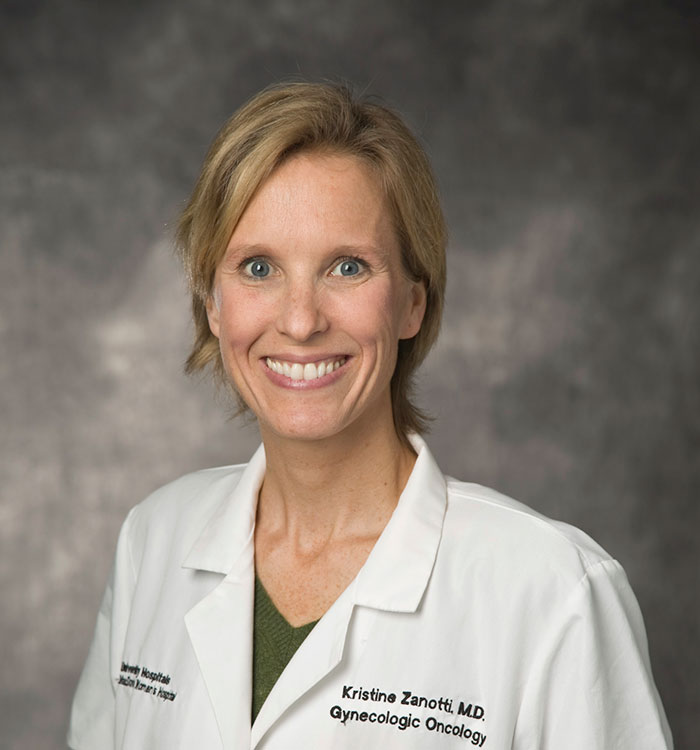Cancer Recovery and Survivorship
July 22, 2021
UH Seidman Cancer Center’s New Program Addresses the Importance of Recovery Care
Innovations in Obstetrics & Gynecology | Summer 2021
Beginning with its breast oncology and gynecological oncology teams, University Hospitals Seidman Cancer Center is rolling out its new CaReS (Cancer Recovery and Survivorship) program to help patients improve their overall wellbeing following cancer treatment.
 Kristine Zanotti, MD
Kristine Zanotti, MD“There is a push to recognize survivorship as a special time in the cancer care continuum,” says Kristine Zanotti, MD, Interim Director of the Division of Gynecologic Oncology at University Hospitals Cleveland Medical Center. “The time after treatment completion is a really dynamic time in terms of the recovery and setting the trajectory for the lifestyle choices the patient is going to make."
Dr. Zanotti, who serves as the director of cancer survivorship, leads the team at UH Seidman Cancer Center that is building the foundation of this program. The team began by gathering resources and outlining a multidisciplinary vision. The program’s stakeholders include nurse practitioners, physician assistants, dieticians, physical therapists, sleep health specialists and social workers.
The nurse practitioners and PAs serve as the backbone of the program, providing education and guidance to patients as they navigate the recovery process. The team helps to address comprehensive wellbeing, looking at different issues like diet, weight management, smoking cessation, sleep hygiene and financial health.
The first step into the CaReS program is an hour-long intake meeting. “We recognized the need for a formalized and standardized evaluation at [patient] intake to establish what care needs are priorities,” Dr. Zanotti says.
Thus far, the program has generated a positive response. Patients have a lot to talk about, and the team is taking this time to evaluate the ideal length and frequency of the appointments. Patients have needed anywhere from one to 12 visits.
“I think the needs are greater than even we anticipated,” Dr. Zanotti says. “It is not a one-off program. It is a partnership until patients achieve their goals.”
As patients work through the recovery process, the CaReS team is carefully tracking their outcomes. The number of patients reached by the program and the number of patient visits are important metrics. Within the visit documentation, the team can drill down further to understand how many patients need counseling on different areas, like diet or sleep health.
In addition to tracking utilization and uptake, the team is leveraging wellbeing questionnaires to understand how patients are responding to the program.
The work on the CaReS program began just before the COVID-19 pandemic. The rollout was ultimately delayed as resources were needed to address this health crisis. Now, the program is rolling out one disease team at a time at UH Seidman Cancer Center. This measured approach is allowing the team to streamline the workflow and find ways to engage patients early on in their cancer care.
“[We want to] help them understand that the recovery phase is just as important as the treatment phase in achieving the ultimate health outcome,” Dr. Zanotti says.
The CaReS program should be fully operational by the end of the year, but the work won’t stop there. Dr. Zanotti hopes to see the focus on cancer recovery and survivorship to expand and reach more people. “I think that it is important to leverage our telehealth technology for the program so we can meet the needs the needs of people out in community sites better without undue burden in transportation,” she says.
UH has provided important support for the program, helping to gather the necessary resources. “It is no small measure to obtain the nurse practitioner and physician assistant resources,” Dr. Zanotti says. “These are valuable providers.”
UH is also committing to additional providers for the program in next year’s budget cycle.
UH Seidman Cancer Center is dedicated to active cancer care, focusing on the illness and the associated treatment toxicities. The CaReS program goes beyond that to help patients actively identify strategies to reenter their lives after treatment.
“We are really following the principles of lifestyle medicine and not just making referrals and prescriptions,” Dr. Zanotti says. “There is a lot of low-hanging fruit when it comes to improving overall health outcomes.”
Reach out to Dr. Zanotti at Kristine.Zanotti@uhhospitals.org to learn more about the CaReS program at UH.
Contributing Expert:
Kristine Zanotti, MD
Interim Division Director
Division of Gynecologic Oncology
UH Cleveland Medical Center
Associate Professor of Obstetrics & Gynecology
Case Western Reserve University School of Medicine


